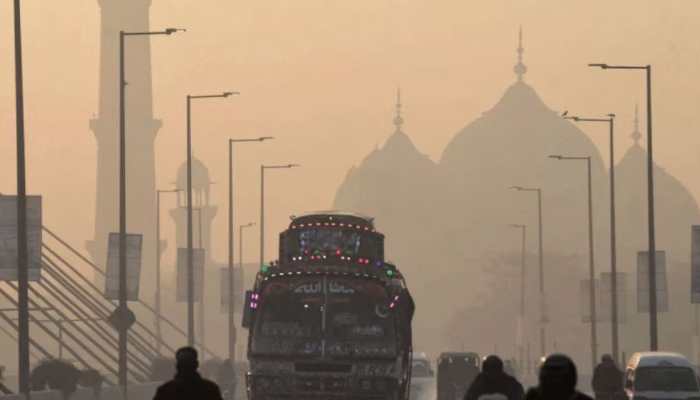Pakistan Air Pollution: 3 Days Lockdown To Be Imposed In Lahore, Multan As AQI Soars Above 2000
In response to the hazardous levels of pollution, the Punjab government has declared a complete lockdown in Lahore and Multan for the upcoming Friday, Saturday, and Sunday.
Trending Photos
) File Photo
File Photo The air pollution situation in Pakistan has reached a catastrophic level, surpassing even the worst environmental conditions seen in the region in recent years. With the Air Quality Index (AQI) crossing the 2000 mark in major cities like Lahore and Multan, the provincial government has been forced to take extreme measures, including imposing a lockdown and declaring a health emergency.
Lockdown Measures in Lahore and Multan
In response to the hazardous levels of pollution, the Punjab government has declared a complete lockdown in Lahore and Multan for the upcoming Friday, Saturday, and Sunday if the situation does not improve by Wednesday.
The lockdown will remain in effect as long as the AQI remains dangerously high, and authorities have pledged to monitor the air quality closely during this period. If the situation does not improve, the lockdown could be extended, further affecting daily life and economic activities in the region.
These drastic steps aim to limit outdoor activities and reduce exposure to the toxic air, which has reached unprecedented levels. The immediate concern is the health impact on the population, with many residents already suffering from severe respiratory issues.
Health Emergency Declared Amid Rising Cases
The pollution crisis has already taken a severe toll on public health, with over 600,000 people in Punjab suffering from respiratory-related illnesses in the past week alone. Among these, approximately 65,000 individuals required hospitalization, creating a massive strain on medical facilities.
Hospitals in cities like Lahore are overwhelmed with patients presenting symptoms such as dry cough, pneumonia, chest infections, and difficulty breathing. Medical staff are under immense pressure, and as a result, leaves for paramedics have been canceled to ensure adequate staffing during the crisis. To manage the influx of patients, outpatient departments (OPDs) in many hospitals have extended their operating hours until 8 PM.
Surge in Hospitals
Mayo Hospital in Lahore has reported more than 4,000 cases of pollution-related illnesses, while Jinnah Hospital has treated 3,500 patients in just a short period. Other hospitals in the region are also seeing similar surges in patient numbers. The situation has led to fears that the healthcare system could soon become overwhelmed if pollution levels continue to rise.
Restrictions on Public and Private Sector Activities
To combat the worsening pollution levels, the Punjab government has imposed a series of measures aimed at reducing emissions. These include the temporary closure of marriage halls, restaurants, and other non-essential businesses that contribute to air pollution. In addition, several shops have been sealed for violating pollution control regulations.
Educational institutions, including schools and colleges, have been closed indefinitely to prevent children and young adults from being exposed to harmful air. Meanwhile, private offices have been ordered to operate at only 50% capacity, a move intended to limit the number of people traveling and working in affected areas.
In a bid to reduce the pollution levels, authorities are exploring innovative measures such as creating artificial rain in certain cities. The goal of these efforts is to cleanse the air and bring down the AQI to safer levels. However, experts warn that such solutions are only temporary and that long-term strategies are essential to address the root causes of the pollution crisis.
Stay informed on all the latest news, real-time breaking news updates, and follow all the important headlines in india news and world News on Zee News.
Live Tv







)
)
)
)
)
)
)
)
)
)
